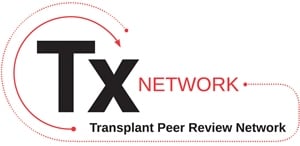Journal list menu
Export Citations
Download PDFs
The AJT Report
The AJT Report News and issues that affect organ and tissue transplantation
- Pages: 509-510
- First Published: 09 February 2012
Many in the transplant community fear that a guideline proposed by the CDC designed to regulate the possibility of transmitting HIV, HBV and HCV through solid-organ transplantation will severely restrict organ availability, inadvertently worsening the overall outcome for transplant recipients.
Literature Watch
LITERATURE Watch Implications for transplantation
- Page: 511
- First Published: 28 February 2012
This month's Literature Watch highlights a study suggesting that fetal T cells are more biased toward immunological tolerance, an insight that will be especially important to transplantation if fetal Tregs promote tolerance to foreign antigens encountered during development.
Editorials
Beyond Belatacept: Praise and Progress for the FDA
- Pages: 513-514
- First Published: 15 February 2012
Transparency and dialogue will be required by the FDA, industry and the transplant community in order to achieve successful clinical trials with novel agents for the challenging unmet needs in organ transplantation. See special article by Archdeacon et al on page 554, and related article by Medina Pestana et al on page 630.
The Declaration of Istanbul Is Moving Forward by Combating Transplant Commercialism and Trafficking and by Promoting Organ Donation
- Pages: 515-516
- First Published: 17 December 2011
The authors provide a critical response to the viewpoint by Ambagtsheer and Weimar (page 571) regarding the Declaration of Istanbul and its stance toward transplant commercialism, organ trafficking and donation.
Timing Is Everything in Tolerance
- Pages: 517-518
- First Published: 17 December 2011
Anergy versus Apoptosis versus Regulation—which mechanism is most critical to stable tolerance induction? See article by Burrell and Bromberg on page 576.
“Tip-Toeing” to an Assay for Transplantation Tolerance?
- Pages: 519-520
- First Published: 07 December 2011
The authors provide a perspective on the article by Haynes and colleagues (page 640) who find that the degree linked-suppression, as measured by the trans-vivo DTH assay, inversely correlates with immunosuppression requirements.
Sirolimus Conversion for Renal Dysfunction in Liver Transplant Recipients: The Devil Really Is in the Details…
- Pages: 521-522
- First Published: 02 February 2012
The authors revisit the current FDA warnings applied to the use of sirolimus in liver transplantation, indicating that they are best considered in the context of comprehensive clinical trial data. See article by Abdelmalek et al on page 694.
Minireviews
Current Status of Organ Transplantation in Japan
- Pages: 523-530
- First Published: 04 November 2011
This minireview provides an overview of transplantation in Japan, highlighting innovative strategies to maximize organ use, and in particular efforts to expand the donor pool using donors after cardiac death and ABO-incompatible donors.
Diabetes Mellitus Following Liver Transplantation in Patients With Hepatitis C Virus: Risks and Consequences
- Pages: 531-538
- First Published: 28 November 2011
Prevention and treatment of posttransplant diabetes mellitus might improve outcomes in hepatitis C virus–positive liver transplant recipients.
Is Prevention the Best Treatment? CMV After Lung Transplantation
- Pages: 539-544
- First Published: 09 November 2011
Cytomegalovirus (CMV) remains a serious threat to long-term graft function after lung transplantation, but recent studies suggest that extending prophylaxis up to 12 months after transplantation significantly reduces the burden of CMV infection and disease.
Transplant Accommodation—Are the Lessons Learned from Xenotransplantation Pertinent for Clinical Allotransplantation?
- Pages: 545-553
- First Published: 02 November 2011
This review summarizes the work performed in xenograft models to investigate the phenotype and mechanisms of accommodation, and asks whether the lessons learned are relevant to aid our understanding of clinical accommodation.
Special Article
Summary of the US FDA Approval of Belatacept
- Pages: 554-562
- First Published: 15 February 2012
The authors discuss the clinical data that were used to support the approval of belatacept in order to illustrate the Food and Drug Administration's process for evaluating products for efficacy and safety. See editorial by Vincenti on page 513, and related article by Medina Pestana et al on page 630.
Meeting Report
Banff 2011 Meeting Report: New Concepts in Antibody-Mediated Rejection
- Pages: 563-570
- First Published: 02 February 2012
This meeting report summarizes the 11th Banff Conference on Allograft Pathology held in Paris in June 2011, whose major outcome was the acknowledgment of C4d-negative antibody-mediated rejection in kidney transplants.
Personal Viewpoint
A Criminological Perspective: Why Prohibition of Organ Trade Is Not Effective and How the Declaration of Istanbul Can Move Forward
- Pages: 571-575
- First Published: 07 December 2011
This personal viewpoint expresses the opinion of the authors on how prohibition of organ trade can be improved. See editorial by Glazier and Delmonico on page 515.
Original Articles
Basic Science
Fates of CD4+ T Cells in a Tolerant Environment Depend on Timing and Place of Antigen Exposure
- Pages: 576-589
- First Published: 17 December 2011
The authors use T cell receptor transgenic CD4+ cells to track the varying fates of T cells following transplantation, and find that fates are dependent upon both the immunologic status of the recipient and the timing of antigen exposure. See editorial by Burlingham on page 517.
Bystander Activation of iNKT Cells Occurs During Conventional T-Cell Alloresponses
- Pages: 590-599
- First Published: 09 November 2011
The authors show that iNKT cells are not intrinsically alloreactive but are activated following transplantation through the sequestration of IL-2 produced by recently activated, conventional alloreactive T cells.
Embryonic Stem Cell-Derived T Cells Induce Lethal Graft-Versus-Host Disease and Reject Allogenic Skin Grafts upon Thymic Selection
- Pages: 600-609
- First Published: 09 November 2011
Thymus-selected T cells derived from HoxB4-transduced embryonic stem cells reject allogenic skin grafts but induce lethal graft-versus-host disease without thymic selection.
Cigarette Smoke Exposure Hinders Long-Term Allograft Survival by Suppressing Indoleamine 2, 3-Dioxygenase Expression
- Pages: 610-619
- First Published: 02 November 2011
The authors find that cigarette smoke exposure hinders the induction of long-term islet allograft survival via suppressing indoleamine 2, 3-dioxygenase expression and activity.
Implanted Adipose-Derived Stem Cells Attenuate Small-for-Size Liver Graft Injury by Secretion of VEGF in Rats
- Pages: 620-629
- First Published: 07 December 2011
The authors describe how the portal infusion of adipose-derived stem cells improves graft function and survival following small-for-size liver transplantation in rats, highlighting the role of secreted vascular endothelial growth factor in this process.
Clinical Science
Three-Year Outcomes From BENEFIT-EXT: A Phase III Study of Belatacept Versus Cyclosporine in Recipients of Extended Criteria Donor Kidneys
- Pages: 630-639
- First Published: 02 February 2012
Three-year results from the BENEFIT-EXT study confirm the durability of the renal function benefits of belatacept over time compared to cyclosporine, while providing comparable 3-year patient/graft survival and balancing risks associated with belatacept in recipients of extended criteria donor kidneys.
Donor-Specific Indirect Pathway Analysis Reveals a B-Cell-Independent Signature which Reflects Outcomes in Kidney Transplant Recipients
- Pages: 640-648
- First Published: 07 December 2011
Indirect pathway T cell responses to donor antigens or allopeptides, and not naive B cell counts in peripheral blood, are found to be correlated with clinical status in tolerant, monotherapy, standard immunosuppression, and chronically rejecting renal transplant recipients. See editorial by Alegre and Chong on page 519.
Reduced Fracture Risk With Early Corticosteroid Withdrawal After Kidney Transplant
- Pages: 649-659
- First Published: 07 December 2011
In this analysis of the United States Renal Data System, discharge from the hospital after kidney transplantation without maintenance corticosteroids is associated with a 31% reduction in fractures leading to hospitalizations.
Association of Complement C3 Gene Variants with Renal Transplant Outcome of Deceased Cardiac Dead Donor Kidneys
- Pages: 660-668
- First Published: 17 December 2011
The donor complement C3F allotype is not associated with renal allograft outcome after kidney transplantation; however, post-hoc analyses within donation after cardiac death donors suggests its protective association with primary nonfunction.
Cytomegalovirus-Specific Regulatory and Effector T Cells Share TCR Clonality—Possible Relation to Repetitive CMV Infections
- Pages: 669-681
- First Published: 14 November 2011
This study relates the impact of cytomegalovirus (CMV)-specific regulatory T cells on the quality of CMV-specific T cell responses to frequent antigen appearance.
Epidemiology of Posttransplant Lymphoproliferative Disorders in Adult Kidney and Kidney Pancreas Recipients: Report of the French Registry and Analysis of Subgroups of Lymphomas
- Pages: 682-693
- First Published: 06 January 2012
The French Registry of posttransplant lymphoproliferative disorders occurring after kidney transplantation in adults is presented.
Sirolimus Conversion Regimen Versus Continued Calcineurin Inhibitors in Liver Allograft Recipients: A Randomized Trial
- Pages: 694-705
- First Published: 10 January 2012
Conversion from calcineurin inhibitor to sirolimus-based immunosuppression for preservation of renal function in liver transplant recipients shows no demonstrable benefit at one year. See editorial by McKenna and Trotter on page 521.
Are Patients with Child's A Cirrhosis and Hepatocellular Carcinoma Appropriate Candidates for Liver Transplantation?
- Pages: 706-717
- First Published: 28 November 2011
Liver transplantation in patients with stage II hepatocellular carcinoma and Child's A cirrhosis results in a very low survival benefit and may not constitute optimal use of scarce liver donor organs.
Transhilar Passage in Right Graft Live Donor Liver Transplantation: Intrahilar Anatomy and Its Impact on Operative Strategy
- Pages: 718-727
- First Published: 02 February 2012
A technical approach to dissection of the hilar plate for live donor liver donation is presented.
Thrombotic Microangiopathy After Living-Donor Liver Transplantation
- Pages: 728-736
- First Published: 09 November 2011
Reduced use of fresh frozen plasma and sensitization against human leukocyte antigens are closely related with posttransplant thrombotic microangiopathy, and poor outcomes may be associated with late onset and delayed diagnosis and/or treatment.
Recipient IL28B Polymorphism Is an Important Independent Predictor of Posttransplant Diabetes Mellitus in Liver Transplant Patients with Chronic Hepatitis C
- Pages: 737-744
- First Published: 02 February 2012
An analysis of liver transplant recipients with hepatitis C virus infection finds that the risk of developing posttransplant diabetes mellitus is significantly increased in recipients carrying the TT polymorphism of the IL28B gene.
Spirometrically Significant Acute Rejection Increases the Risk for BOS and Death After Lung Transplantation
- Pages: 745-752
- First Published: 28 November 2011
The authors demonstrate that acute rejection episodes that occur concurrent with a 10% or greater drop in baseline lung function harbor a poor prognosis and identify patients at increased risk for earlier bronchiolitis obliterans syndrome and worse posttransplant survival.
Characterization of the Ileal Microbiota in Rejecting and Nonrejecting Recipients of Small Bowel Transplants
- Pages: 753-762
- First Published: 07 December 2011
Analysis of the gut microbial community in the ileostomy output of small bowel transplant patients can discriminate between patients that are or are not rejecting their grafted intestines.
Brief Communications
B-Cell Depletion Extends the Survival of GTKO.hCD46Tg Pig Heart Xenografts in Baboons for up to 8 Months
- Pages: 763-771
- First Published: 09 November 2011
The authors describe the use of recipient B cell depletion and genetically modified donor pigs in a series of heterotopic pig to baboon cardiac xenografts with survival up to 8 months.
Time-Trends in Publication Productivity of Young Transplant Surgeons in the United States
- Pages: 772-778
- First Published: 17 December 2011
The publication of scientific work is uncommon among transplant surgeons, especially among young surgeons.
Case Report
ABO-Incompatible Lung Transplantation in an Infant
- Pages: 779-781
- First Published: 07 December 2011
The authors present the first report of an ABO-incompatible lung transplantation in an infant.
Reports From the CDC: MMWR
Transmission of Hepatitis C Virus Through Transplanted Organs and Tissue – Kentucky and Massachusetts, 2011
- Pages: 782-785
- First Published: 28 February 2012
Hepatitis C virus (HCV) transmission to two kidney recipients and a tissue recipient occurred related to false reading of nucleic acid test results in an HCV seronegative donor.
Images in Transplantation
CME
Hepatocellular Carcinoma (HCC) in a Patient With Hepatitis B Virus (HBV) Infection
- Pages: 786-788
- First Published: 28 February 2012
Letters to the Editor
Need for Oversight and Standardization of HIV Screening for Living Organ Donors
- Pages: 789-790
- First Published: 06 January 2012
Response to Klintmalm on the Use of Generic Immunosuppression
- Page: 791
- First Published: 17 December 2011
Immunosuppression, Generic Drugs and the FDA
- Pages: 792-793
- First Published: 17 December 2011
Potential Risks of Metformin in Transplant Patients
- Page: 795
- First Published: 10 January 2012
Metformin Safety Posttransplantation—Trials and Tribulations
- Page: 796
- First Published: 10 January 2012




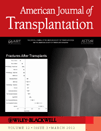
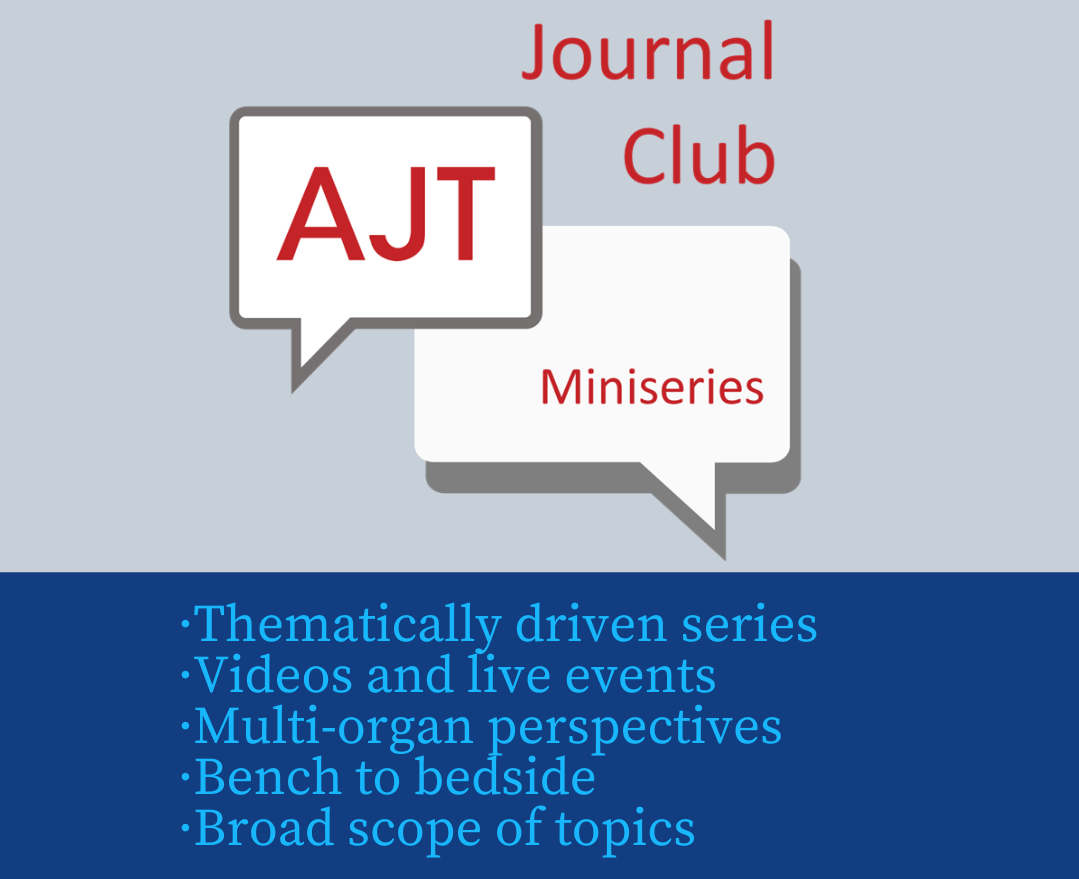


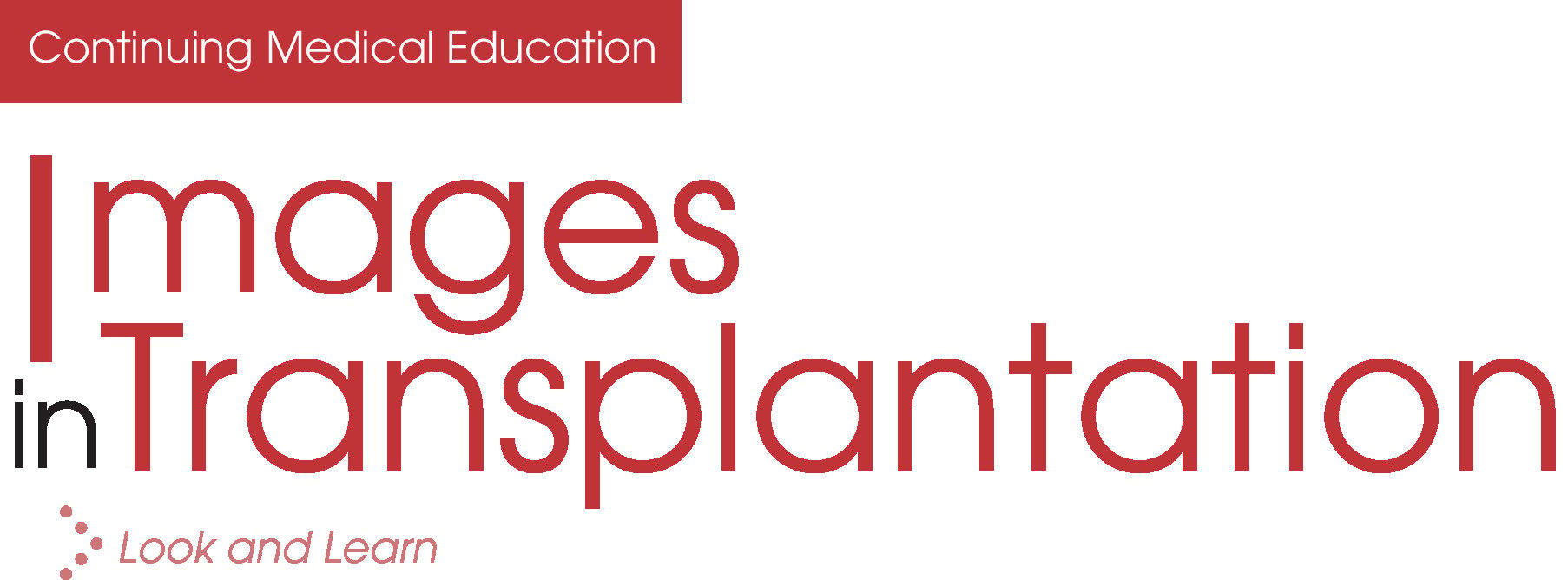
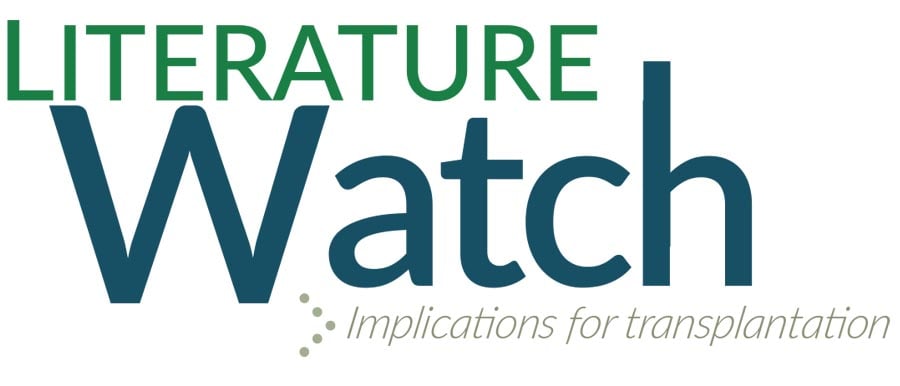
.jpg)
